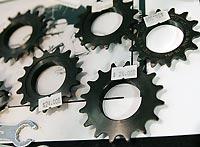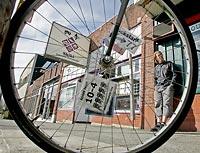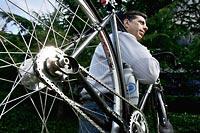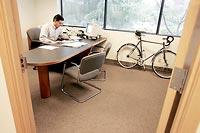Fixed-sated: Coasting is for poseurs. Fixed-gear bikes are about the pedaling

The "fixie" (n): A fixed-gear, single-speed bike without a freewheel, used for racing at bike tracks known as velodromes. Also used by fearless bike messengers and, increasingly, dedicated commuters. The bikes may or may not include brakes and they come in a wide range of patinas: shiny Surly Steamrollers, for example, or weathered and mismatched because the bike was constructed from an old road bike and various swap-meet parts.
You can get from point A to point B on an ordinary bike, but why bother when the ride is superior on a fixie?
The business commuter knows this as he pedals in his Lycra, water bottle at the ready.
The road racer, mulling the perfect pedal stroke, understands.
And is it even worth arguing with the bike messenger?
The fixed-gear bike, or "fixie" as it's called in some circles, has been around a long time, some people will tell you. (Some of these people are bike messengers who grump about how the media always tries too hard to look for the latest "trend.")
But the bikes are clearly becoming more mainstream, even among that group of urban bike rider who has never been to or even knows or could care less about an alleycat race (ask a bike messenger).
Seattle's Counterbalance bike shop, owned and operated by (nice) messengers draws the messenger crowd but caters mostly to commuters.
"Mike [De Salvo] who's a frame builder, about two years ago was doing maybe six [fixed-gear] bikes out of 150," says one of the shop's owners, Adam Smith. "Last year he did about 80."
Chris Cashbaugh, Seattle-based bike nerd and Web chronicler of all things bike (http://blog.iheartbikes.com) also weighs in: "From what I know there's a certain market that's definitely expanding. There's the bike-messenger crowd, the guys who hang out with bike messengers, the people who've gotten them to train on and the ones who commute."
And finally there's the perspective of Dennis Bean-Larson, who lives all the way in Traverse City, Mich., but who operates the premier site for bike porn, er, pictures of gorgeous fixed-gear machinery (www.fixedgeargallery.com).
It was 1999 when the 60-year-old real-estate agent was participating in an Internet forum and discovered that some people didn't know what "fixed-gear" meant. So he uploaded a photo. Others sent in theirs. In 2001, his Web site showcased photos of 51 fixed-gear bikes. Last year photos of 1,418 bikes were sent in.
The tricycle was your first fixed-gear bike. You could never coast on a tricycle — remember how those pedals kept moving even as you pushed it up a hill?
The fixed bike also has only one gear, a rebel to those bikes with 15, 18 even 27 gears. Riding fixed around here means you are, or you soon will be, quite strong.
"I can't just gear down and go granny. You have to stand up and start mashing," says Scottie Kosman about riding uphill. "You feel a little more connection with the bike and therefore, you feel more in control. Which is why so many who ride fixed are so obsessive about their bikes."
The fixed bike is a direct-drive machine. There's still a chain, but the chain drives a cog fixed to the rear wheel. There's no ratchet mechanism that would allow you to coast, so as the rider pedals forward, the wheel goes forward as well.
The fixed bike also, typically, has either just one or no brakes. You slow down by pedaling slower, which isn't as easy it sounds.
"I hopped on one of the bikes we built, and I took it out back and just about stacked it," says Jef Michel, owner of BikeSport in Ballard. "Old dog, new tricks. It just doesn't appeal to me."
But oh, its appeal to those "utility cyclists." In their bike-centric view of the world, the fixie is wholesome, primitive, poetic.
Because of the way the bikes look — stripped-down with no derailleurs, no shifters, no brake cables cluttering things up — and because of that symbiosis of feet-always-pedaling, you are nothing but the bike.
"You think much more about the line, your path through obstacles," Chris Nygaard, a local technical writer, explains. "A pothole, a grate, a car pulling out. How do I do it without slowing down? Suddenly it becomes a much more Zen-like pursuit."
You've seen these bikes before: roaring fearlessly downtown; "trackstanding" at traffic lights; huddled together outside a Belltown bar. Fixed bikes carry their hip-looking riders on a group ride every Thursday evening from Westlake Park. The bikes also race one another at the Marymoor velodrome. (Track bikes are fixed-gear bikes but not all fixed-gear bikes are track bikes, just so you know.)
You're likely to see more and more of these bikes as riders — in either their cut-offs or their Pearl Izumi shorts — post more photos online and word-of-mouth cross-pollinates all strata of the bicycling scene.
Because the bikes, you see, are a class equalizer. The poor college kid finds an old junky frame in his parents' garage and he "fixes" it. Suddenly he's pedaling with nary a care to the world.
The crusty messenger, bike properly outfitted with spoke cards, gives the kid his props. Even the commuter guy, with his bike computer on the handlebars, gets an approving nod.
"I was in San Francisco, and I was in the process of building my bike and determining what my gear ratio was," recalls Jim Manoledes, president of a finance company in Bellevue. "And I was in my suit, and I encountered some bike messengers, in their cut-off shorts, looking pretty gnarly, looking like they didn't want to talk to me — until I started talking fixed gear."
Manoledes converted to fixed gear last fall after he stopped running and took up biking and well, how could he not since word had spread?
"I feel a lot more free because you don't do anything other than pedal," he says. "It's the very basics of riding. It's like cooking a really good meal but doing everything from scratch."
Florangela Davila: 206-464-2916 or fdavila@seattletimes.com



The "fixie"![]()
![]()
(n): A fixed-gear, single-speed bike without a freewheel, used for racing at bike tracks known as velodromes. Also used by fearless bike messengers and, increasingly, dedicated commuters. The bikes may or may not include brakes and they come in a wide-range of patinas: shiny Surly Steamrollers, for example, or weathered and mismatched because the bike was constructed from an old road bike and various swap-meet parts.